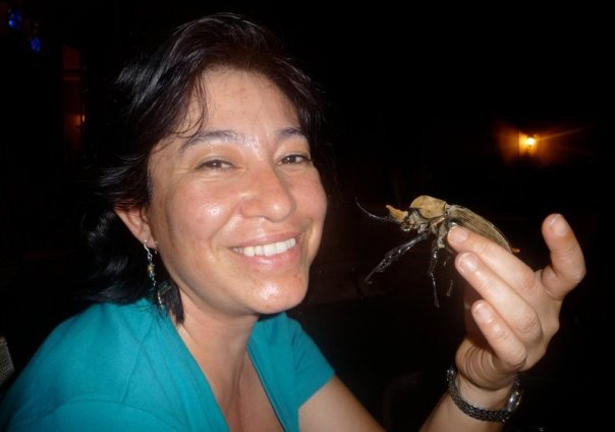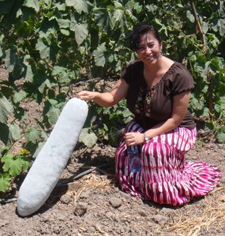This Is What Science Looks Like at NC State: Yasmin Cardoza

Editor’s note: This post comes from Yasmin Cardoza, an associate professor of entomology at NC State. The post is part of an an ongoing series that we hope will highlight the diversity of researchers in science, technology, engineering and mathematics. The series is inspired by the This Is What A Scientist Looks Like site.
I was born in a small little town in western Honduras, 15 minutes away from the very famous Mayan ruins of Copán. I spent the first 10 years of my life in the region and spent most of my childhood outdoors. My first entomological experiences were using insects as “toys,” as in collecting June bugs to treat as seriously injured hospital patients, tethering locusts to fly as “airplanes” around town and sticking blades of grass into leaf-cutting ant nests just to see all the workers furiously attacking the intruding piece of plant material.
After my tenth year I moved to the capital city of Tegucigalpa, in the center of the country, to continue my education. Insects continued to be part of my daily life as I took up gardening as a hobby and had to manually remove pests from my veggie patch. After graduating from high school I decided I would like to become a veterinarian, but since there were no vet schools in Honduras, I applied and obtained a scholarship to attend a private international boarding school, the Panamerican School of Agriculture (Zamorano), where I was to receive intensive training in all areas of agricultural production. This was a three year program with the first year focusing on horticultural crops, the second year on row crops and the third year on animal science. The learning program was planned to have a perfect balance of theory and practice by spending four to five hours on hands-on production practices in the field, and an additional five hours of classes. The school implemented a military-based activity structure and discipline. The environment within the school was highly interactive and very multicultural, with students from all the countries of Latin America and the Caribbean. I graduated with an agronomist degree after three years, but not before discovering that entomology was actually the career path I would like to follow.

After graduating from Zamorano, I took advantage of its collaborative agreement with the University of Florida in Gainesville, where I could transfer most of my credits from Zamorano to obtain a B.S. degree in Entomology and Nematology (bugs and worms) within a year. I then continued with my M.S. and Ph.D. degrees in the same department, taking a year in between each degree to gain real-life experience performing research on various plant and insect systems at the USDA-ARS facilities in Gainesville.
After graduating with my Ph.D., I had the opportunity to travel to Perth, Australia for a postdoctoral fellowship to conduct research on host plant resistance in lupins (equivalent to soybeans in Mediterranean climates) to green peach aphids (plant lice). After a year in Perth, I took up a research associate position at the University of Wisconsin-Madison to conduct research on the microbial ecology of bark beetles. Two and half years later, I found my way back to the USDA in Gainesville, Florida, where I conducted research on the chemicals mediating interactions between the red imported fire ants and their natural enemies. Shortly after returning to Gainesville, I was invited to interview for my current position at NC State. This was the first interview for a permanent position I ever had and…I got it!!
I have been happily employed as faculty member at NC State for over seven years, and I made tenure in July 2013. My appointment is largely research but I also have teaching responsibilities.
My research focuses on exploring environmentally-friendly alternatives to pesticides to manage agricultural pests in a more sustainable manner. To this end, I delve into areas of biological control, host plant resistance, chemical ecology and microbe-plant and microbe-insect interactions to better understand the biology and ecology of each system of interest. I teach a graduate level class on insect ecology and two seminars on plant-insect interactions and insect mutualisms. I also mentor graduate (M.S. and Ph.D.) and undergraduate students interested in conducting research on insect and plant systems.
My program also provides opportunities for international students and scholars interested in conducting research on the systems of interest for our team. As a service to the university, I have become a promoter of internationalization for our college activities and enjoy facilitating student and faculty exchanges to and from Latin America and Europe.
I am also a member of the Center for Environmental Farming Systems (CEFS), which engages researchers and farmers interested in sustainable production practices throughout the southeastern U.S. CEFS is a collaboratively managed organization involving NC State, NC A&T, and the North Carolina Department of Agriculture and Consumer Services, all working in cooperation with NC Choices to promote sustainable agriculture. In addition, I am a faculty and executive committee member of the Genetic Engineering and Society program, which aims to provide a multidisciplinary formation for Ph.D. students regarding cutting edge technologies, with the ultimate aim of producing professionals equipped with a comprehensive toolbox to make critical decisions regarding development and implementation of such technologies in a manner that takes into account, not only the economic, but also the ecological, sociological and cultural implications of such actions.
I am married to another entomologist, and in his company I love to travel and we take every opportunity afforded to visit new places. In my spare time I like gardening, photography, hiking, listening to music, dancing, cooking and sharing time with friends. I love dogs and have rescued four of them, who along with eight chickens are part of my very diverse family in Raleigh.
- Categories:


